JMW biography
March 14, 2017 started by John
JOHN MICHAEL WADE, who has died aged 79, was a stalwart news sub-editor at The Daily Telegraph for decades helping to propel the newspaper’s circulation to record levels. The small Back Bench team ensured that their domestic news coverage was unrivalled in the whole of Fleet Street in the 1970s and 80s.
John Michael Wade was born at his aunt’s house, 14 Leafield, Retford, Notts., on January 16, 1938. He was the son of Police Constable William “Bud” Wade and his wife Sarah. He then returned to live on Newcastle Avenue, Worksop where his father was based. At that time, little Roy Hattersley, a fair bit older than JMW and later deputy leader of the Labour party, was living with his aunt on the opposite side of Newcastle Avenue.
Life in the Nottinghamshire force meant frequent postings and house moves and the next place the family occupied was the large White House in the centre of the village of Edwinstowe. One Sunday, ”Bud” Wade took the infant out in a pram and stopped to have a drink with a few pals at the Jug and Glass pub with the pram parked in a nearby cobble-stone alley. Returning to the White House, his wife inquired where was the baby? So “Bud” had to hot-foot it back to the pub, where JMW was still fast asleep in the pram.
The next stop was a move to Newark for the rest of the Second World War where a giant Hitler effigy was burned on a bonfire on open land opposite their Windsor Avenue home with its Anderson shelter in the garden.
At that time, his mother considered males far superior to females and thus brought up JMW and his brother, Nicholas James Wade (born 1942 and later Professor of Visual Perception at Dundee University) as lads having an easy life. Though his mother was a fine cook, she never taught her boys how to prepare food, nor, when both parents were regional champion dancers did they ever give one dancing lesson to either boy. The only household tasks they had to perform were to polish their shoes and very occasionally dry washed pots.
Most of JMW’s upbringing was in Mansfield, the town - and football team - he identified with. He lived in three different homes in Mansfield, where he attended Brunts Grammar School from 1949-54 leaving to become a cub reporter on the now-defunct Notts Free Press at nearby Sutton-in-Ashfield. Later he was a pioneer Open University student obtaining a degree in Humanities.
National Service in the RAF included a posting with 49 Squadron to Christmas Island in the Pacific. There JMW went up on a practice run in a white Valiant bomber the day before it exploded an 8 megaton H-Bomb in an airburst 8,000ft above the ocean. As soon as the bomb doors opened, the Valiant put visors over the cabin windows and soared off at its top speed into the blue yonder. Meanwhile, on the ground 30 miles away on the real run, JMW was among the RAF squaddies who sat beneath coconut trees wearing sunglasses and with their backs to the blast. There was a count-down, followed by searing heat on their backs and then a count-up for folk to rise and cross the road before the sound blast struck. Lazy risers had coconuts fall on their heads, while others were knocked to the ground mid-stride by the sound wave. As the troops watched, the familiar mushroom cloud appeared in the sky. The devastation this bomb could have wrought was enough to annihilate London.
Soon after his demob, JMW moved to Tyneside as a reporter - and later sports writer - on the Shields Gazette, South Shields. It was there that he met his first wife, Christine Margaret Elizabeth Coleman, another journalist. They married at Marsden church in 1960. An adventurous pair, they emigrated to Africa after a brief honeymoon in Northumberland at Barrasford, a village near Hadrian’s Wall.
Northern Rhodesia was the destination and after a long flight by Viscount propeller plane via Rome, Wadi Halfa, Khartoum, Entebbe and Ndola, they landed at Lusaka for JMW to join the now-defunct thrice weekly newspaper, the Central African Post. In this role, JMW, like the rest of the office reporters - among them his own wife - got to know the agitating African Nationalists campaigning for independence - eventually won in 1964 in what became Zambia.
On one occasion, JMW was taken by the office African driver to a bush rally held by Kenneth Kaunda (later the country’s president for 25 years) and was ushered into a side hut, where Kaunda’s aides, all of whom he knew, sipped tea. Then two giant mammies with large bare breasts entered the hut and began polishing the shoes of all present. JMW lifted his feet up for the ritual, but never discovered why it was done. Kaunda addressed 5,000 black faces from a platform with a tin roof. JMW sat beside him at a table, whereby KK would halt his speech in the native vernacular to inform the reporter what he was saying in English. Of course, the local reporters were the conduit between the nationalists and the government of the then Federation of Rhodesia and Nyasaland. The latter was later to be given independence as Malawi headed by the former Tyneside doctor Hastings Banda. After two years in Northern Rhodesia, JMW took up a post as information officer in the Federal government at Salisbury, Southern Rhodesia (now Harare, Zimbabwe), mainly being involved in producing a monthly newspaper called FACT in various native dialects as well as French. At times, this proved to be a rather difficult editing option as often it needed 10 vernacular words to describe what one English word meant.
JMW and his wife returned to England in 1963 aboard the rusting Union Castle liner Stirling Castle before he joined The Daily Telegraph for the first time. He was quickly promoted to be “splash sub” composing the front page lead from a variety of sources and also got his first taste of copytasting, whereby he had to read mountains of agency and staff copy to help the back bench team decide which stories were going to make the newspaper. This was at a time when the Telegraph’s domestic coverage was unrivalled in Fleet Street propelling the circulation to almost 1.5 million copies a day. Admittedly this was before the days of 24-hour news radio and television programmes as well as giveaway free newspapers and the rise of the internet.
JMW moved for a brief spell to the Daily Express before joining the now-defunct Guardian Journal in Nottingham as a sub-editor, where he set about writing a novel which was eventually unfinished and unpublished. As the Nottingham newspaper management launched a plan to close the morning paper, JMW led NUJ strikes and finally set up a rival weekly paper, printed on a flatbed machine at the Institute for Workers’ Control in a Nottingham back street. Once the Guardian-Journal was closed and its staff were made redundant, JMW and some like-minded journalists and printers launched The Press, a suburban weekly paper with innovations such as theatre and club listings soon copied by the T. Bailey Forman Evening Post. The Press lasted only five weeks before its business backer challenged the editor, JMW, and in a showdown, JMW quit. The paper soon after died.
Next it was back to Fleet Street working on The Daily Telegraph mainly as copytaster or chiefsub and then Chief Assistant News Editor for the next 30 years under five editors - Sir Colin Coote,who rarely showed his face to staff, the diffident Maurice Green, hale and hearty Bill Deedes, Max Hastings, who had a very short attention span at the morning conferences, and the youthful Charles Moore.
A dab hand at headline writing, he produced a gem in the 1970s when the French government decided to place junior masseurs at service stations to give British and German car drivers some relief on their way to the Mediterranean. The punning headline on it was “Aches en Provence”.
It was while on the news desk that one of the strangest stories emerged. JMW was news editor of the day on a Sunday when the World Philosophy Conference was being held at Brighton. JMW despatched the ace reporter Richard Barry O’Brien to the event only to be horrified at the morning conference to learn that there was a half-page already in type about the state of world philosophy today. “Call Barry’s bleeper (a pager before mobile phones were invented) and bring him back forthwith”, he told the news desk secretary. Barry could not be raised as he had left his bleeper in a coat pocket in the cloakroom. Next morning, JMW went to speak to Barry but the reporter intervened to say that the dissident Czech philosopher Julius Tomin had cycled from Oxford to Brighton sleeping in farmers’ fields to attend the event. “Get back to Brighton with a photographer for I want an image of Tomin with his bicycle and wearing cycle clips”, JMW instructed. The picture duly appeared on the front page of the paper the next day. But there was then another bombshell since Tomin was due to appear before an Oxford industrial tribunal to decide whether or not he continued studying philosophy in the Bodleian Library or sweeping the streets of Oxford. O’Brien was instructed to get Tomin to Oxford by taxi and produce a full report on the hearing. When this was published in the Telegraph, there was a bombshell to beat all the earlier ones: the Irish landlord of The Bee Hive pub at Swindon, Wilts, appointed Tomin as his pub philosopher to give two lectures a year to customers. Tomin was delighted to garner a regular income. The world’s TV, radio and press representatives flocked to the first lecture. And none of this would have happened if the reporter had not left his bleeper in the cloakroom.
In his later years at the Telegraph, JMW was moved by Hastings to run the Obituaries page since Max thought that no-one should be in the same post for more than five years. JMW retired in 2003 and began the serious job of keeping a daily diary to ensure that his brain cells did not rust. He had done this once in 1987 but later entries were lost on Apple computers and redundant disks when the operating systems kept changing. Somehow the 2003 and 2004 diaries disappeared into a black hole in his large garage at Woodford Green, but the rest were intact.
During his early retirement, JMW reinvented himself as a sculptor. He first bought a sale-price wooden B&Q pack intended to create shelving, but radically changed it to make a multi-coloured work entitled Bizarre Baazar to replace a dead California lilac tree on a garden wall. Then using a bathtub and a sink, he created a giant work entitled “En Suite” which was too big for the house interior wall and remained stuck in his garage. Other creations followed. These artworks and others can be seen on the website superart.info and many of his excellent photographs adorn the walls of his colourful home in Woodford.
JMW was known in Fleet Street as “Gaffer” after a Mansfield pal tried to explain to his miner father what his back bench role was at the Telegraph. The miner responded: “Then he’s the gaffer”. The name stuck. In 1978 with spoil heaps at Nottinghamshire collieries being razed, JMW wrote a poem ridiculing this change. “Slagheaps of My Youth” became a traditional rendition at every subs’ Christmas lunch from then on and was trenchantly delivered by the author at many subsequent golf club events as well.
JMW considered himself an abject failure when it came to book publishing. His first work, “Valet’s Diction” had him retrace his grandfather’s 1906 footsteps to a fishing lodge on the Laerdal river in Norway, where JMW was surprised to find that the bedclothes, long dining table and cutlery were the same as when the high-ranking army officers his grandfather worked for entertained the Prince and Princess of Wales to lunch and a fishing expedition. Grandfather WJ Wade was a keen photographer and recorded the visit of the Royal family and their attendants on his plate camera. In 2007 JMW was invited to open an exhibition of his grandfather’s words and images at the new Norwegian Salmon Fishing Museum at Laerdal and presented the museum with the original account of the 1906 visit hand-written by his grandfather. The self-published paperback on the Norway jaunt had modest sales, though JMW showed a profit on it by writing articles for magazines and the Telegraph on how to do it.
After unexpectedly being elected captain of Woodford Golf Club, north-east London, in 2013, JMW decided that as a lousy golfer, he had to make a significant impression. So at the Captain’s drive-in, he devised a unique “Robin Hood” sketch with the Merry Men to delight the members watching. Then, clandestinely, he kept a record of what went on at the club during his year of office and produced a colourful account under a pseudonym. Everything that happened to JMW was attributed to Captain Mashie Niblick, the two names coming from ancient Scottish terms for what these days are numbered irons. It sold well among club members, but not much beyond the confines of Woodford even though it was promoted in Scotland, Nottinghamshire and the Home Counties. His third book venture was to extract travel tales from a gigantic chronicle of the year 1985 when he recorded at great length on his typewriter events which happened daily across the world. The book, “The Day before Yesterday - a tour of Britain in 1985” was published in 2016 on the Amazon website as a paperback and Kindle download. Sales were poor.
A great traveller, JMW returned to Zambia in 2016 and never came across one African who was alive when he arrived there in 1960. Indeed, the friendly Zambians took JMW to their heart when he pointed out that he knew the “father of the nation” KK who, at 92, still had his image on the nation’s banknotes.
Something of a lothario, JMW had two wives and then four mistresses. His first wife, the late Christine Margaret Elizabeth Coleman, provided him with a son and two daughters. After their divorce, he took up with the school teacher and Olympic runner Phyllis Winger, who had held the 1500 metres world record in 1965 and competed in the 1960 Rome Olympics. After a long courtship, there was a brief marriage. After that experience, JMW vowed never to get married again. So for four years he lived at Woodford Green with Dr Jean Cooper, a consultant anaesthetist at the Whittington hospital, Highgate, before she died of breast cancer in 1999. Then, he took up with a Telegraph secretary, Jean Saunders, but she died in 2008 from a brain tumour. Next he courted the widow of a former colleague, Jayne Ann Clarke, a City secretary, but this relationship broke down after a mere nine months.
Finally, in 2009, although an agnostic himself, he took up with his last partner, Susanna Ferrar, a committed Christian running a boarding house at Stoke Newington. Ms Ferrar is kin to Nicholas Ferrar (1592-1637) notable for setting up the first Christian community in England after Henry VIII’s dissolution of the monasteries. His base in a Cambridgeshire hamlet not only became a focus for Christian worship, but was visited by the poet TS Eliot who later wrote “Little Gidding” as one of his epic “Four Quartets”. Susanna’s grandfather Hartley Ferrar was the geologist on Scott and Shackleton’s first expedition to Antarctica on RRS Discovery (1901-4). The vessel is now in dry dock at Dundee. JMW accompanied Susanna on the “Shackleton Centenary Expedition”, organised by the Friends of the Scott Polar Research Institute in 2014, and manfully took up car parking duties each year at the T S Eliot Festival at Little Gidding.
Then in February 2017, out of the blue, he was diagnosed with inoperable lung cancer with just “weeks” to live unless he tried to stem the attack by taking a chemotherapy course which could stretch his life on earth for maybe a year according to oncologists. As a positive being, he decided to compile an anthology of extracts from the 30 years of diaries under the title “Pensive” to have some target at which to aim and began to note dates down in a notebook.
JMW leaves three offspring - son Guy and daughters Claire and Penelope - and seven grandchildren.
[The artwork above is by John's brother Nicholas Wade.]
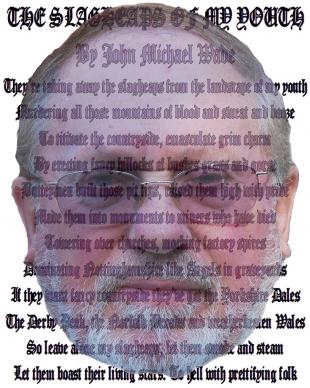
 Bizarre Bazaar
Bizarre Bazaar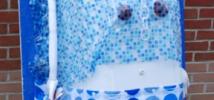 En Suite
En Suite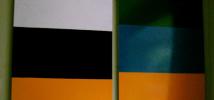 Fibonacci Duo
Fibonacci Duo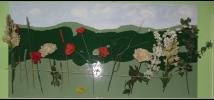 Artifice
Artifice Lavatory humour
Lavatory humour Change
Change The Art of Darkness, 2012
The Art of Darkness, 2012 Cloud necklace
Cloud necklace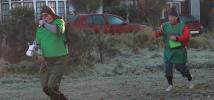 Performance Art
Performance Art Photographs
Photographs Square-up to the 2012 Carlinalympics
Square-up to the 2012 Carlinalympics Captain Niblick – the world's worst golf skipper
Captain Niblick – the world's worst golf skipper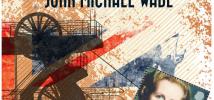 The Day Before Yesterday - a tour of Britain in 1985
The Day Before Yesterday - a tour of Britain in 1985 The Old Colonial Boy
The Old Colonial Boy JMW biography
JMW biography